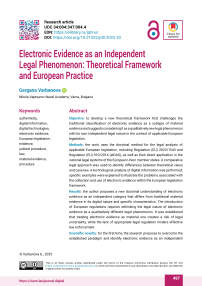Electronic Evidence as an Independent Legal Phenomenon: Theoretical Framework and European Practice
Автор: Varbanova G.
Журнал: Journal of Digital Technologies and Law @lawjournal-digital
Статья в выпуске: 3 (3), 2025 года.
Бесплатный доступ
Objective: to develop a new theoretical framework that challenges the traditional classification of electronic evidence as a subtype of material evidence and suggests considering it as a qualitatively new legal phenomenon with its own independent legal nature in the context of applicable European legislation. Methods: the work uses the doctrinal method for the legal analysis of applicable European legislation, including Regulation (EU) 2023/1543 and Regulation (EU) 910/2014 (eIDAS), as well as their direct application in the national legal systems of the European Union member states. A comparative legal approach was used to identify differences between theoretical views and case law. A technological analysis of digital information was performed; specific examples were explained to illustrate the problems associated with the collection and use of electronic evidence within the European legislation framework. Results: the author proposes a new doctrinal understanding of electronic evidence as an independent category that differs from traditional material evidence in its digital nature and specific characteristics. The introduction of European regulations requires rethinking the legal nature of electronic evidence as a qualitatively different legal phenomenon. It was established that treating electronic evidence as material one creates a risk of legal uncertainty, while the lack of appropriate legal regulation hinders effective law enforcement. Scientific novelty: for the first time, the research proposes to overcome the established paradigm and identify electronic evidence as an independent legal category in the system of evidence types. The article substantiates the unique digital nature of electronic evidence and the need to create an independent legal framework in various national legislations. It is proposed to improve scientific terminology using the term “electronic evidence”, which corresponds to the legal definitions in the legislation under study, instead of the outdated term “digital evidence”. Practical significance: the work contains specific practical recommendations for the use of electronic evidence in the procedures for its identification, storage, presentation and analysis in various court proceedings in accordance with applicable supranational legislation. The research helps to overcome outdated ideas about the legal nature of electronic evidence and their incorrect identification with material evidence. This is important for effective law enforcement in the European Union member states.
Authenticity, digital information, digital technologies, electronic evidence, European legislation, evidence, judicial procedure, law, material evidence, procedure
Короткий адрес: https://sciup.org/14134127
IDR: 14134127 | УДК: 34:004:347:004.4 | DOI: 10.21202/jdtl.2025.20


